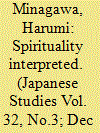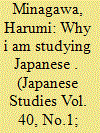|
|
|
Sort Order |
|
|
|
Items / Page
|
|
|
|
|
|
|
| Srl | Item |
| 1 |
ID:
117503


|
|
|
|
|
| Publication |
2012.
|
| Summary/Abstract |
Lexical borrowing is associated with emerging social needs. It provides a new word for a newly introduced idea or thing, replaces a native word adding trendiness or euphemism, allows ambiguity, etc. The noun supirichuariti ('spirituality') and the adjective supirichuaru-na ('spiritual') present an intriguing case of borrowing in Japanese. Both emerged in the wider context of the 'New Spirituality' movements and culture in Japan. They began to be used in such professional fields as terminal care, psychology, and education in the 1990s. More recently the use of the word supirichuaru, in particular, has become trendy in the narrower context of a 'spiritual boom', in which it is often associated with 'spiritualism', and has come to refer to a range of interests and experiences associated with the boom. By drawing data from a wide range of discourse genres, this article elucidates the complexity of the borrowing processes. The article also argues that these Western loanwords, used in different subcultures with differing and often elusive meanings, are linguistic evidence, however ephemeral it may be, that reveals a common thread which runs through the current spiritual culture in Japan, where no native Japanese words have been able to take up the role.
|
|
|
|
|
|
|
|
|
|
|
|
|
|
|
|
| 2 |
ID:
171952


|
|
|
|
|
| Summary/Abstract |
This article discusses findings from a nationwide survey of New Zealand tertiary-level students’ reasons for studying Japanese, their sense of satisfaction with the tertiary Japanese learning experience, and their future aspirations. The findings show that there are several aspects of students’ learning experiences which reflect a positive integrative orientation, while practical goals associated with the university learning context were also evident. The findings also suggest that the language learning context is multi-dimensional, supported by a number of different sources, both virtual and physical, as well as inside and outside the classroom. Furthermore, students from different programs within each university, and those who had or had not studied Japanese prior to entering university, revealed different attitudes towards learning Japanese and different visions of their future. While the study found that the majority of students are satisfied with their current university courses and value formal learning over informal acquisition of language, our findings suggest that teachers should reconceptualise their teaching roles to embrace the wider language learning context available to our students.
|
|
|
|
|
|
|
|
|
|
|
|
|
|
|
|
|
|
|
|
|